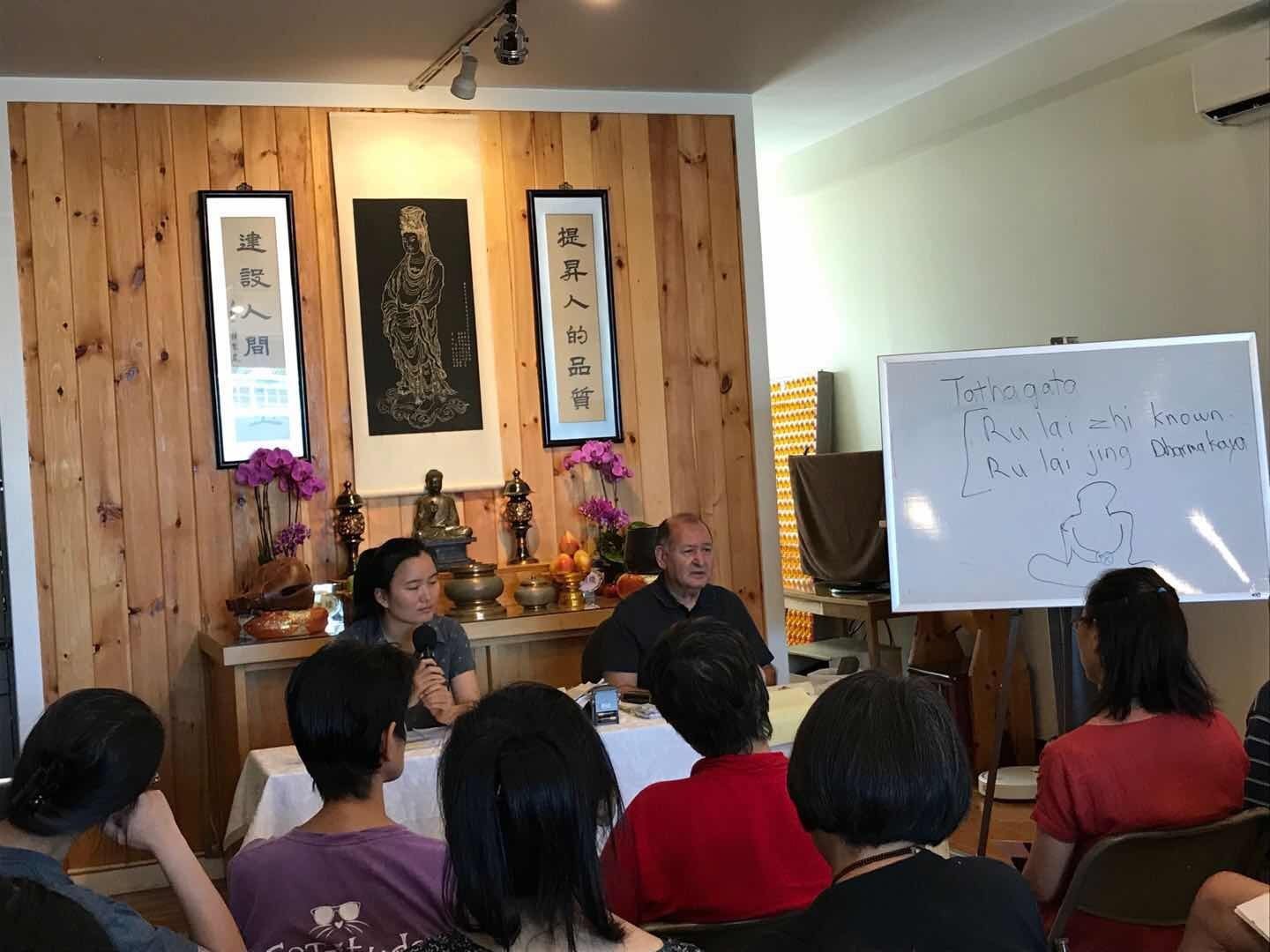Experience sharing
Chan Meditation Center English Sunday Dharma Talk - Chan 101-2 by Gilbert Gutierrez
 This is the 2nd lecture by Gilbert Gutierrez on Chan 101, hosted by Chan Meditation Center (CMC). In this 50 minutes’ presentation, Gilbert presented us both historically and doctrinally, what is Chan in relationship to knowing what is mind and the unique nature of mind, and the exoteric and the esoteric ways of Chan practice.
This is the 2nd lecture by Gilbert Gutierrez on Chan 101, hosted by Chan Meditation Center (CMC). In this 50 minutes’ presentation, Gilbert presented us both historically and doctrinally, what is Chan in relationship to knowing what is mind and the unique nature of mind, and the exoteric and the esoteric ways of Chan practice. Although the word “Chan” originated from China, it could be traced back to the very beginning, when the Buddha twirled the flower and the Mahakashyapa just smiled and nodded his head, which expressed that in his own mind, there is a joining of the mind of the Buddha. This was how Gilbert opened up his lecture to explain that Chan is about how we practice and what are practicing mind, not practicing making this body a better human being, but to explore beyond words and phrases via contemplation of mind.
Gilbert told us that we are stuck in our illusory world, driven by our habitual tendencies, governed by karma as individuals and as a group. In fact, even Buddha told his disciples that he had to experience three days of headache because once in his previous life, he hit a beached fish in the head three times with a stick. This enormous, beached fish was slaughtered pieces by pieces by his Shaky clan as preservation of fish meat while the fish was alive. Later on, that fish turned into a prince in his next life.
The prince’s father king asked to marry a princess of Shaka for a connection with Shaka clan, but the bride that his father married to, was actually a maid, disguised as a princess. So, the king married a maid of Shaka clan instead. Due to the prevailing Caste system and social value at that time, Shaka clan felt more superior. Later on, when the prince grew up into a teenager boy, he had a horrible experience when he visited the Shaka clan one day. Because the prince’s mother was a maid, the prince boy was looked down upon and badly insulted by the Shaka clan. So, the prince vowed revenge. Even the Buddha and his disciple Mahamaudgalyayana could not save Shaka clan from the revenge, as individual and group karma of Shaka clan. It is therefore apparent that everything that is appearing is interconnected, the law of dependency of origination.
Gilbert then, continued on to ask us that in this world, if we have a will, can we really change things as we go along since it is predestined. He quickly announced that although we cannot change mind, but appearances within mind can be changed, otherwise there is no necessity or reason to give four great vows. By this statement, he had a quantum shift, to orient us to the deep end of a pool, from about Chan Master Lingchi to the predecessors of Lingchi, Masu, Bysong and Huangpo. In one of Master Lingchi’s treatise, he said “For 12 years now, I have been searching for this thing called karma and I have not found anything that can be called karma, even the size of a mustard seed.” This statement seems to contradict the 12 dependencies of origination. So, if there is no karma, what is mind? This led us to a profound concept of Ekayana and raised us question of “what is mind?”
Gilbert went a little beyond Chan 101 during the lecture, to shed some light on the truth of the matter, that from mind’s perspective, all phenomena is not real, which led us to ponder on what is apparent reality and what is absolute reality and the middle way that Nagarjuna in fact, never gave a direct answer.
During this lecture, Gilbert also introduced us to the interesting anecdotes about how Chan patriarchs conducted Dharma and also mind to mind transmission and how Master Masu tactfully and “mischievously” asked Bysong where did the ducks go and when Bysong gave an apparent answer, he gave Bysong a painful grasp and twist of his nose, it was from this painful twist of Bysong’s nose, that Bysong wrote a famous statement:“It’s only until “today” that I realized my nostrils were pointed downwards”. This is an interesting example of how a patriarch helped his disciple to achieve sudden enlightenment or “subitism”, a term that originated from Master Huineng.
I don’t want to tell you more stories that Gilbert told us during many of his lectures. I encourage you to start listening to this lecture and many others by Gilbert, you will find that Gilbert teaches us eighty-two thousand ways how to know our mind. As he answered in one of Q&As, although there is only one path to enlightenment, there are many ways to get there.
Note: Video link: https://www.youtube.com/watch?v=5DHwZgjhNQs
@Wrote by Rong Chen
